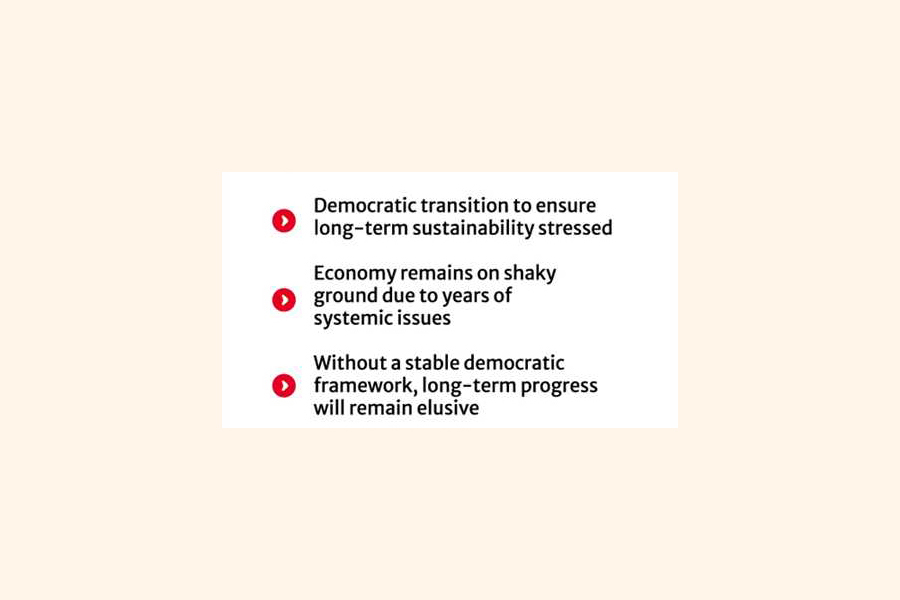
Published :
Updated :

President of the Bangladesh Chamber of Industries (BCI) Anwar-Ul-Alam Chowdhury has issued an urgent call to stabilise Bangladesh's fragile economy, urging a three-year deferral of its planned graduation from Least Developed Country (LDC) status.
At a press conference held at the BCI office in Dhaka's Tejgaon on Saturday, Mr Chowdhury highlighted the critical challenges threatening the nation's economic health and stressed the need for urgent reforms required to avert potential collapse. He also emphasised the importance for a democratic transition to ensure long-term sustainability.
"The economy remains on shaky ground due to years of systemic issues, including unchecked bank looting, political unrest, and the erosion of institutional accountability. Without decisive action and a stable democratic framework, long-term progress will remain elusive," Chowdhury stated.
He said the economic headwinds facing Bangladesh, compounded by global crises such as the COVID-19 pandemic and the Russia-Ukraine war, have severely disrupted supply chains and driven up costs. Chowdhury, however, argued that domestic policy failures, governance inefficiencies, and neglect of economic priorities by previous administrations have exacerbated the situation.
"High inflation, dollar devaluation, energy shortages, and rising unemployment continue to cripple the manufacturing sector, the backbone of the country's economy," he said.
LDC graduation: A looming threat
Mr Chowdhury placed significant emphasis on the challenges posed by Bangladesh's impending graduation from LDC status, scheduled for November 2026.
He warned that the transition, without adequate preparation, could be catastrophic for key industries, particularly the ready-made garments (RMG) sector, which accounts for 40 per cent of manufacturing jobs and 85 per cent of exports. "Graduating prematurely would be economic suicide," he cautioned.
"Businesses need time to adapt to the loss of trade privileges and the imposition of higher tariffs. Without a deferral, the economy risks a severe collapse."
He noted that by 2029, Bangladeshi garment exports to the European Union will face a 12 per cent tariff, while competitors like Vietnam will benefit from zero-tariff access starting in 2027 under free trade agreements.
This disparity, coupled with rising production costs and energy shortages, has already pushed 100 garment factories to close in the past year, with another 200 on the brink of shutting down," he said.
Challenges facing businesses
Chowdhury outlined a litany of challenges stifling economic growth, including soaring energy prices, an inefficient banking system, and dwindling investor confidence.
"Gas prices have risen by 286 per cent, electricity costs by 33.5 per cent, and wages in the garment sector have significantly increased, squeezing profit margins further."
Meanwhile, he said, foreign direct investment (FDI) has dropped by 20 per cent, and private sector credit growth has slowed, reflecting deep uncertainty.
"These issues have created a climate of fear among businesses. Local manufacturers are struggling to stay afloat, while foreign investors hesitate to commit resources," he explained.
He also pointed to the rising cost of locally produced yarn, which has made imports more competitive, further undermining domestic production.
Chowdhury slammed the government's preoccupation with political issues over economic recovery, lamenting a lack of actionable reforms to address the worsening situation. He urged policymakers to prioritise employment, inflation control, and cost reduction to restore stability.
Path forward
Looking ahead, Chowdhury called on the interim government to take decisive measures to facilitate a smooth transition for businesses, ensuring they are adequately prepared for the challenges of LDC graduation. He announced that the BCI, in collaboration with other stakeholders, would submit a set of comprehensive proposals to the government within the next two to three weeks.
These proposals, he explained, aim to make the manufacturing sector globally competitive and sustainable. "We must adopt forward-looking policies to secure our position in the global market. With proper support, the RMG sector and other industries, such as packaging, footwear, and light engineering, can thrive and contribute to long-term growth," he added.
Despite the grim outlook, Chowdhury expressed optimism about Bangladesh's economic potential. He cited a projection by HSBC that Bangladesh's economy could grow to $750 billion by 2030, becoming the 26th largest globally. "Additionally, the global RMG market, valued at $573 billion in 2023, is expected to grow to $815 billion by 2030, presenting significant opportunities for expansion."
Chowdhury concluded by emphasising the resilience of the Bangladeshi people and the importance of collective efforts to overcome current challenges. "With the right reforms and collaboration between the government and the business community, we can stabilise the economy, safeguard jobs, and create a brighter future for the nation," he said.
bdsmile@gmail.com


 For all latest news, follow The Financial Express Google News channel.
For all latest news, follow The Financial Express Google News channel.